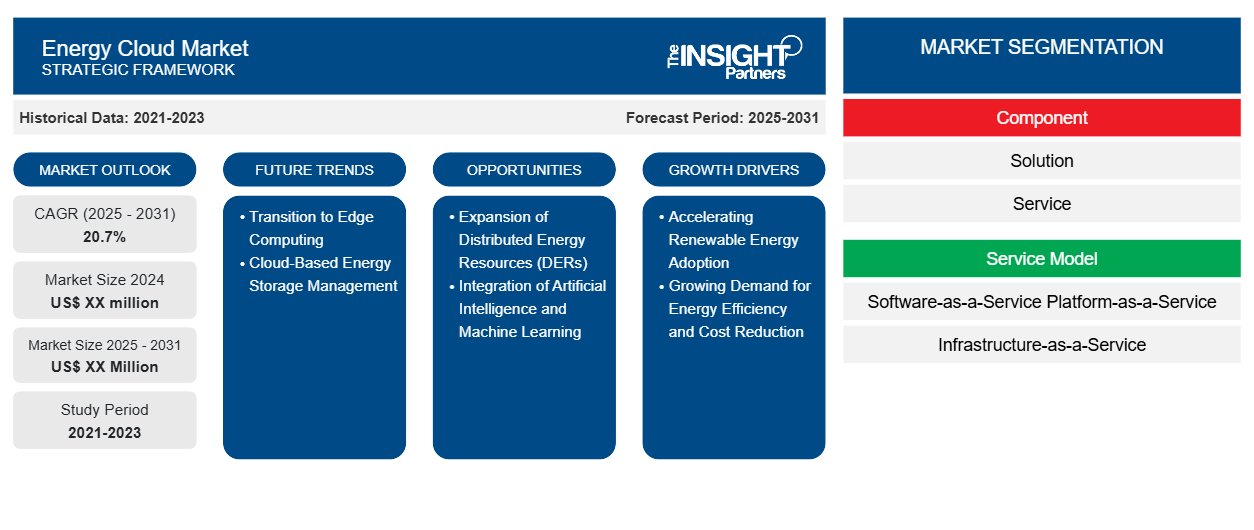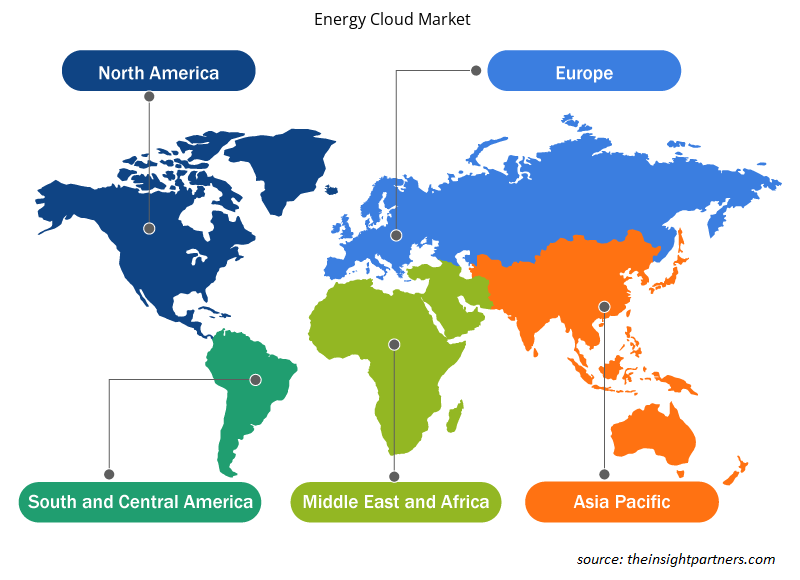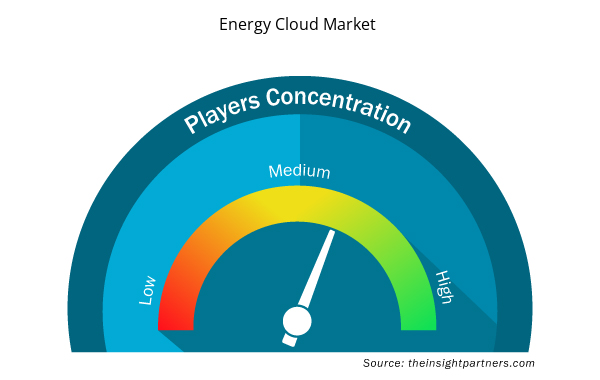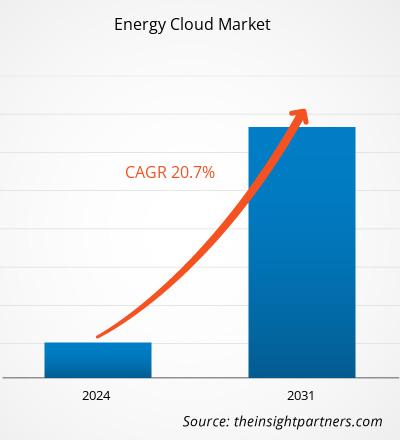The Energy Cloud Market is expected to register a CAGR of 20.7% from 2025 to 2031, with a market size expanding from US$ XX million in 2024 to US$ XX Million by 2031.
The report is segmented by Component (Solution, Service); Service Model (Software-as-a-Service (SaaS), Platform-as-a-Service (PaaS), Infrastructure-as-a-Service (IaaS)); Deployment Model (Public cloud, Private cloud, Hybrid cloud); Organization Size (Small and Medium Enterprises (SMEs), Large enterprises); Geography (North America, Europe, Asia-Pacific, Middle East & Africa, South and Central America).
The global analysis is further broken-down at regional level and major countries. The report offers the value in USD for the above analysis and segments
Purpose of the Report
The report Energy Cloud Market by The Insight Partners aims to describe the present landscape and future growth, top driving factors, challenges, and opportunities. This will provide insights to various business stakeholders, such as:
- Technology Providers/Manufacturers: To understand the evolving market dynamics and know the potential growth opportunities, enabling them to make informed strategic decisions.
- Investors: To conduct a comprehensive trend analysis regarding the market growth rate, market financial projections, and opportunities that exist across the value chain.
- Regulatory bodies: To regulate policies and police activities in the market with the aim of minimizing abuse, preserving investor trust and confidence, and upholding the integrity and stability of the market.
Energy Cloud Market Segmentation
Component
- Solution
- Service
Service Model
- Software-as-a-Service Platform-as-a-Service
- Infrastructure-as-a-Service
Deployment Model
- Public cloud
- Private cloud
- Hybrid cloud
Organization Size
- Small and Medium Enterprises
- Large enterprises
Customize This Report To Suit Your Requirement
You will get customization on any report - free of charge - including parts of this report, or country-level analysis, Excel Data pack, as well as avail great offers and discounts for start-ups & universities
Energy Cloud Market: Strategic Insights

- Get Top Key Market Trends of this report.This FREE sample will include data analysis, ranging from market trends to estimates and forecasts.
Energy Cloud Market Growth Drivers
- Accelerating Renewable Energy Adoption: The global push towards renewable energy sources is a significant driver for the Energy Cloud market. Governments and organizations are increasingly investing in solar, wind, and other renewable technologies to combat climate change and reduce reliance on fossil fuels. Energy Cloud platforms enable the integration of diverse renewable energy sources into the grid, allowing for better management, distribution, and utilization of clean energy. This trend towards sustainability is fueling the demand for Energy Cloud solutions that facilitate the transition to a more renewable energy landscape.
- Growing Demand for Energy Efficiency and Cost Reduction: As energy costs rise and concerns about climate change increase, businesses and consumers are more focused on energy efficiency and cost reduction. Energy Cloud solutions provide tools for monitoring, analyzing, and optimizing energy consumption, helping organizations reduce waste and lower expenses. By leveraging cloud-based analytics and management tools, users can identify inefficiencies and implement strategies to improve energy performance. This growing emphasis on energy efficiency is driving adoption of Energy Cloud technologies across various sectors.
Energy Cloud Market Future Trends
- Transition to Edge Computing: A notable trend in the Energy Cloud market is the transition towards edge computing, which involves processing data closer to the source rather than relying solely on centralized cloud servers. Edge computing allows for faster data processing and real-time decision-making, which is particularly important in energy management applications where immediate responses are essential. This trend is driving the development of Energy Cloud solutions that leverage edge computing to enhance efficiency and responsiveness in energy systems.
- Cloud-Based Energy Storage Management: Energy cloud platforms are being used to optimize energy storage systems. These platforms allow utilities and businesses to manage energy storage devices (like batteries) by monitoring capacity, charging cycles, and discharge patterns in real time. This improves energy availability, reduces costs, and supports the transition to renewable energy by balancing supply and demand.
Energy Cloud Market Opportunities
- Expansion of Distributed Energy Resources (DERs): The rise of distributed energy resources, such as rooftop solar panels, battery storage systems, and electric vehicles (EVs), presents significant opportunities for the Energy Cloud market. These resources allow for localized energy production and consumption, reducing the strain on traditional energy infrastructure. Energy Cloud platforms can help manage and optimize the integration of DERs into the grid, facilitating energy trading and enhancing grid resilience. Companies that develop solutions to harness and manage DERs can tap into this growing market.
- Integration of Artificial Intelligence and Machine Learning: The incorporation of artificial intelligence (AI) and machine learning (ML) into Energy Cloud solutions offers opportunities for enhanced analytics and predictive capabilities. AI and ML can analyze vast amounts of energy data to identify patterns, optimize energy usage, and forecast demand. This can lead to improved decision-making and more efficient energy management. Vendors that invest in developing AI-driven Energy Cloud solutions can differentiate themselves and provide added value to customers seeking advanced analytics and automated optimization.
Energy Cloud Market Regional Insights
The regional trends and factors influencing the Energy Cloud Market throughout the forecast period have been thoroughly explained by the analysts at Insight Partners. This section also discusses Energy Cloud Market segments and geography across North America, Europe, Asia Pacific, Middle East and Africa, and South and Central America.

- Get the Regional Specific Data for Energy Cloud Market
Energy Cloud Market Report Scope
| Report Attribute | Details |
|---|---|
| Market size in 2024 | US$ XX million |
| Market Size by 2031 | US$ XX Million |
| Global CAGR (2025 - 2031) | 20.7% |
| Historical Data | 2021-2023 |
| Forecast period | 2025-2031 |
| Segments Covered |
By Component
|
| Regions and Countries Covered | North America
|
| Market leaders and key company profiles |
Energy Cloud Market Players Density: Understanding Its Impact on Business Dynamics
The Energy Cloud Market market is growing rapidly, driven by increasing end-user demand due to factors such as evolving consumer preferences, technological advancements, and greater awareness of the product's benefits. As demand rises, businesses are expanding their offerings, innovating to meet consumer needs, and capitalizing on emerging trends, which further fuels market growth.
Market players density refers to the distribution of firms or companies operating within a particular market or industry. It indicates how many competitors (market players) are present in a given market space relative to its size or total market value.
Major Companies operating in the Energy Cloud Market are:
- Accenture plc
- Capgemini
- Cisco Systems, Inc.
- HCL Technologies Limited
- Hewlett Packard Enterprise Development LP
Disclaimer: The companies listed above are not ranked in any particular order.

- Get the Energy Cloud Market top key players overview
Key Selling Points
- Comprehensive Coverage: The report comprehensively covers the analysis of products, services, types, and end users of the Energy Cloud Market, providing a holistic landscape.
- Expert Analysis: The report is compiled based on the in-depth understanding of industry experts and analysts.
- Up-to-date Information: The report assures business relevance due to its coverage of recent information and data trends.
- Customization Options: This report can be customized to cater to specific client requirements and suit the business strategies aptly.
The research report on the Energy Cloud Market can, therefore, help spearhead the trail of decoding and understanding the industry scenario and growth prospects. Although there can be a few valid concerns, the overall benefits of this report tend to outweigh the disadvantages.
- Historical Analysis (2 Years), Base Year, Forecast (7 Years) with CAGR
- PEST and SWOT Analysis
- Market Size Value / Volume - Global, Regional, Country
- Industry and Competitive Landscape
- Excel Dataset


- Thermal Energy Storage Market
- Nuclear Decommissioning Services Market
- Rugged Phones Market
- Enzymatic DNA Synthesis Market
- Grant Management Software Market
- Social Employee Recognition System Market
- Oxy-fuel Combustion Technology Market
- Glycomics Market
- Vertical Farming Crops Market
- Legal Case Management Software Market

Report Coverage
Revenue forecast, Company Analysis, Industry landscape, Growth factors, and Trends

Segment Covered
This text is related
to segments covered.

Regional Scope
North America, Europe, Asia Pacific, Middle East & Africa, South & Central America

Country Scope
This text is related
to country scope.
Frequently Asked Questions
Some of the customization options available based on the request are an additional 3-5 company profiles and country-specific analysis of 3-5 countries of your choice. Customizations are to be requested/discussed before making final order confirmation# as our team would review the same and check the feasibility
The report can be delivered in PDF/PPT format; we can also share excel dataset based on the request
Accelerating Renewable Energy Adoption and Growing Demand for Energy Efficiency and Cost Reduction are the major factors driving the Energy Cloud Market
Transition to Edge Computing is anticipated to play a significant role in the global Energy Cloud Market in the coming years
The Energy Cloud Market is estimated to witness a CAGR of 20.7% from 2023 to 2031
Trends and growth analysis reports related to Technology, Media and Telecommunications : READ MORE..
1. Accenture plc
2. Capgemini
3. Cisco Systems, Inc.
4. HCL Technologies Limited
5. Hewlett Packard Enterprise Development LP
6. IBM
7. Microsoft
8. Oracle
9. SAP SE
10. Tata Consultancy Services Limited

 Get Free Sample For
Get Free Sample For